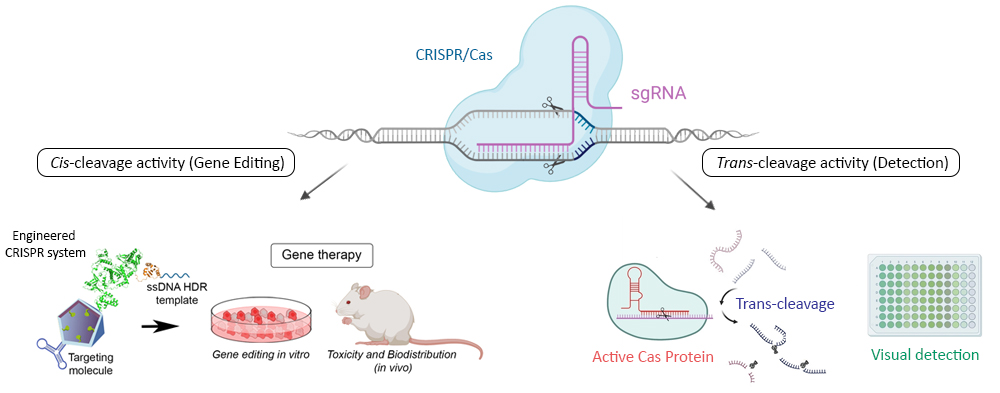RESEARCH PROGRAMMES
P3: Nanomedicine against cancer and infection
RESEARCH SUPERVISOR(S)
Dr Milagros Castellanos
Dr Begoña Sot
RESEARCH TOPIC DESCRIPTION
The cure for complex human diseases such as cancer relies on cutting-edge biomedical tools towards early detection and personalized therapies. Since its discovery, CRISPR technology has become the best option for genome editing. As many tumors are caused by mutations, CRISPR is a promising therapeutical approach for these kind of diseases, because it can repair DNA mutations in the genome in a sequence-specific manner by Homologous-Directed Repair (HDR). However, the efficacy of this route is low and requires a stable sequence template at the target site. To increase the HDR rate and minimize off targets, the candidate will engineer a CRISPR protein fused to a peptide adaptor, capable of bind covalently a DNA template for HDR mutation repair in situ.
As with previous gene therapy strategies, the delivery method is a clear bottleneck. We need to find approaches to avoid the immune system, while driving the editing tool to specific genomic sites. For the moment, there is no treatment for the systemic administration of CRISPR, and it is imperative to find a safe an efficient way to release this tool inside human cells. Therapeutic strategies based on nanotechnology have provided excellent results in the clinics[1]. The candidate will explore the vehiculization of CRISPR in protein nanocompartments (PNC). PNC will drive many editing systems together, protecting the cargo until it reaches its cellular target. PNCs can be decorated with specific ligands for a targeted delivery in cells, or filled with drugs/nucleic acids/HDR enhancers, bursting the antitumoral potential of these nanotherapies.
Furthermore, CRISPR has also been exploited for molecular detection in “point-of-care” devices. The recent coupling of CRISPR-based nucleic acids sensors with nanotechnology has opened a novel field with great potential[2]. The candidate will explore the capabilities of CRISPR for early and minimal-invasive detection of somatic tumor driving mutations in liquid biopsies.
[1] X. Xu, C. Liu, Y. Wang, O. Koivisto, J. Zhou, Y. Shu, H. Zhang, Adv. Drug Deliv. Rev. 2021, 176, DOI 10.1016/j.addr.2021.113891.
[2] C. Escalona-Noguero, M. López-Valls, B. Sot, BioEssays 2021, 43, DOI 10.1002/bies.202000315.
POSITION DESCRIPTION
A typical background would be in molecular biology or biochemistry, with skills to be used for the design and preparation of engineered proteins and protein nanoparticles. Ideally, with experience in protein-nucleic acids complexes, molecular biology, gene editing and cellular testing. Preparation and characterization of nanoparticles and covalent surface functionalization with biomolecules will be also valued.
The fellow should be able to work in a multidisciplinary team with researchers from other fields of science (chemistry, biology, pharmacy, physics, biotechnology). The candidate will be accountable to the supervisors but is expected to conduct research independently and with self-motivation.
PARTNER ORGANIZATIONS
A secondment will be carried out at CIEMAT, where the candidate will apply the CRISPR technology to innovative hematopoietic and epithelial therapies.

